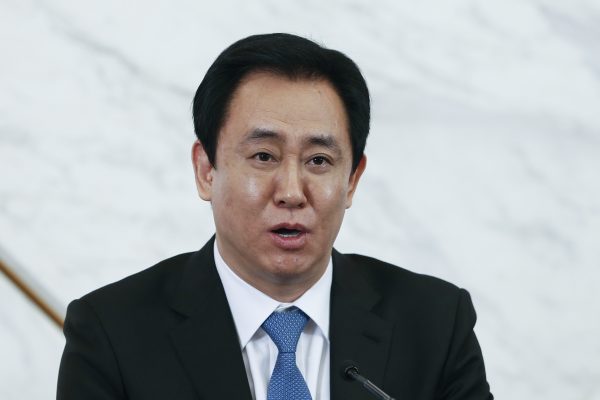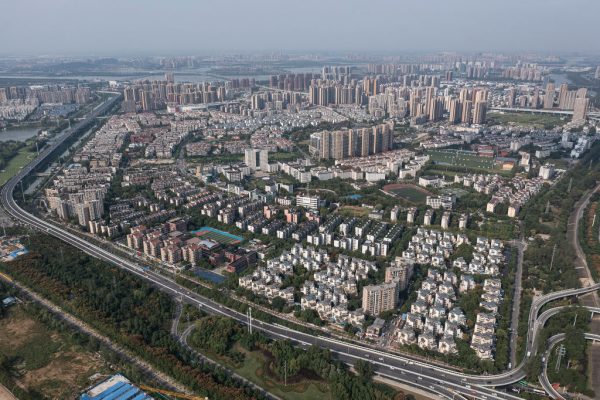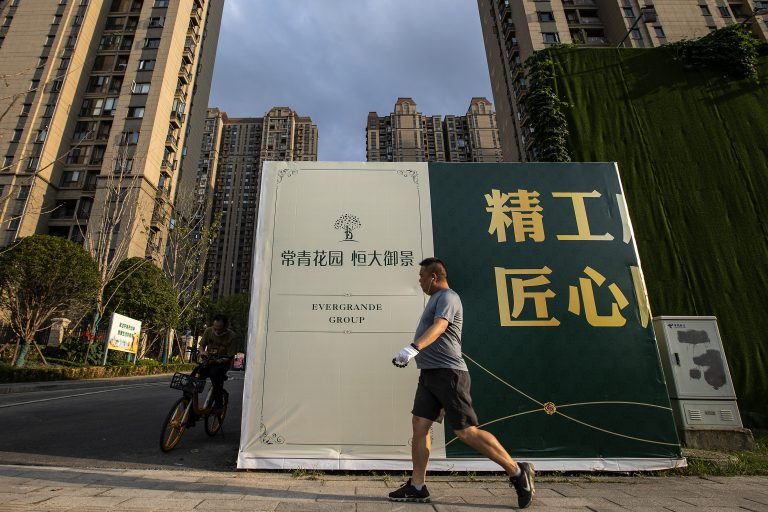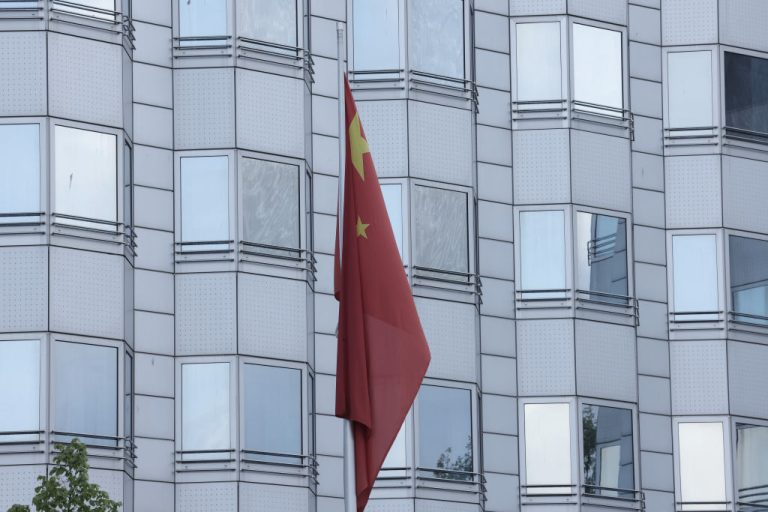On Sep 22, in an attempt to assure concerned western investors, the Evergrande Group announced that it will pay RMB$232 million (US$35.9 million) in interest on bonds due in September 2025 with a coupon rate of 5.8 percent, providing a respite for Evergrande which is currently attempting to overhaul its capital structure and repair its image.
No announcement has been made concerning Evergrande’s other pressing debts, leaving it unclear how the company intends to manage $83.5 million worth of bond interest payments that were due on Sep. 23.
Dr. Frank Tian Xie, Professor of Marketing and John M. Olin Palmetto Chair Professor in Business at the University of South Carolina Aiken, said that the way Evergrande’s crisis unfolds may be like dominoes, dragging down China’s real estate industry and financial banking industries, consequently causing more problems.
Powerful CCP families profit
By analyzing how the Evergrande crisis unfolds, one can observe how the Chinese Communist Party’s powerful and wealthy hollow out China.
In 1996, Xu Jiayin founded the Evergrande Group of Companies. In fact, many Chinese real estate companies sprang up between 1992 and 1996.
Success
You are now signed up for our newsletter
Success
Check your email to complete sign up
In 1992, the Communist Party carried out so-called reforms to demutualize state-owned enterprises into privately owned joint-stock companies, a process that allowed most of China’s state-owned assets to flow into the hands of the Communist Party’s powerful and wealthy families.
Many state-owned enterprises went public in Hong Kong before 2000, and commenced buying land, bidding for land, and buying land through land auctions, causing land prices to rise significantly.
The commissions, rebates, and huge loans from banks to facilitate the purchasing of land were very profitable.
The process unfolded as such. Loans were secured through banks, land was purchased, the value was raised, and the dividends were then returned to the hands of the CCP elite. This is how the Communist regime amassed huge amounts of wealth very quickly.
Xu Jiayin’s Evergrande also started up in a similar fashion. Unlike western real estate companies, which accumulated more than a hundred years of experience before becoming well established in the industry, Evergrande got rich overnight.
After being listed in Hong Kong, Evergrande obtained money from mainland lenders, used that money to buy real estate properties in Hong Kong, and the capital gained in Hong Kong was then returned to the mainland to invest.
Through being listed on the Hong Kong Stock Exchange (HKSE) and through real estate transactions, the elite’s ill gotten fortunes were transferred overseas, exchanged for foreign currency, and then further invested in Europe, the United States and other Western countries.

Power grab spans generations
Communist Party elite families influence every major industry in China and that influence spans generations.
During the Deng Xiaoping era, another powerful CCP member, Chen Yun, believed that the country would be better off if it was put into the hands of the children of Deng’s, Chen’s and other powerful families.
This was a comprehensive power grab by the CCP’s “2nd Red Generation”, which implies that the children’s parents, like Deng and Chen, were the “1st Red Generation.” The CCP often called its taking over of the country the “Red Revolution”.
The families also had, and still have, an internal private agreement. Each family member had its own field of business. Each family would provide one person to participate in the political arena and share power, another child would serve in the military, placing them in charge of military factions, and then another child would go into business to earn money.
According to a VOA report published in 2012, Jiang Zemin’s family was heavily invested in the telecom industry. Jiang Zemin’s son, Jiang Mianheng, was the Chairman of Netcom, whose business covered telecom, semiconductor manufacturing, engineering and construction. Jiang Zemin’s grandson, Jiang Zhicheng, worked for Goldman Sachs before establishing Boyu Investment Advisory Ltd. and creating a private equity fund valued at US$1-billion.
Deng Xiaoping’s family is in real estate, non-ferrous metals, and arms. Deng Xiaoping’s second son, Deng Qifang, established the Sifang Real Estate Company, which acquired land in Shanghai, Beijing, Tianjin, Dalian, Guangzhou, Shenzhen and Zhuhai, and was called the “King of Real Estate”.
Deng’s son-in-law, Wu Jianchang, established Dongfang Xinyuan and other companies, monopolizing non-ferrous metal resources. Deng Xiaoping’s youngest son-in-law, He Ping, established Poly Group and became a giant arms dealer.
Li Peng’s family is in the power industry, Li Peng’s eldest son, Li Xiaopeng, was the Chairman of Huaneng International Group and Vice President of China National Power Corporation.
According to Bloomberg, former Chinese Vice President Zeng Qinghong’s niece, Zeng Baobao, founded Fancy Year Holdings in 1996 and went public with the company in 2009 and mainly developed real estate projects in Shenzhen and Chengdu, where Zeng Bao was the executive director and a significant shareholder.
There are some enterprises controlled by the 2nd Red Generation, the 3rd Red Generation and the 2nd Official Generation (the children of the ministers, governors, and mayors). There are also some companies where the CCP’s influential people are hiding behind the scenes, and those who come forward, such as recently resigned Chair of Evergrande Xu Jiayin, the former chairman of China Huarong Asset Management Co. and Lai Xiaomin who was quickly sentenced to death.
Former China Development Bank Chairman Hu Huaibang and Tomorrow Group’s previous owner ,Xiao Jianhua, were the “white gloves” of those influential people.
Evergrande’s Bankruptcy may be a scheme to embezzle wealth
Prof. Xie pointed out, the process of bankruptcy for Evergrande is the process of the CCP elite embezzling the country’s wealth.
Prof. Xie said, “The interest rate is now close to zero in the United States, Europe, and Japan. If a company has a good reputation, it can get a loan with a very low-interest rate. For example, in Hong Kong, a good reputable company can get a loan with a 1% interest rate. But the interest rate of Evergrande’s loan in Hong Kong is 10%. It also borrowed a lot of foreign debt, and some have interest rates of 10-20% or even 36%. These are ultra-high interest loans; obviously there are many trickeries here.”
“First, these banks lend to them at such high-interest rates. The banks must have been aware that they are in bad shape. Plus, both sides dare to borrow and dare to lend, which is to say that there is a transfer of wealth behind. So as we see this Evergrande, on the one hand it is a high-interest borrowing, debt increase, on the other hand, it is a rapid dividend giving, so it is a direct transfer from the bank money, the Treasury’s money to some individual ’s hands. Xu Jiayin himself is a white glove, who helped transfer money to the hands of the real owner behind him. This is a process of embezzling the wealth from the country and the state enterprises.”
Prof. Xie further pointed out that Evergrande’s development model is unsustainable, “it is because of the excessive borrowing, through the Chinese Communist Party itself to sell land, and then speculate on the price of land in China, from which the Chinese Communist Party powerful and wealthy people are profiting.”
“In addition, when the price of land speculation up, the entire real estate is a bubble. You see, like the price of houses in China, even Americans are surprised, the face value of China’s several big cities together are more than half that of the United States,” Xie said.
“Once the sales are down, your capital flow will be in trouble. Now foreign investors have seen through the real estate bubble in China, and foreign investors are afraid to get involved. Just like Blackstone Group Inc. was going to buy Soho China Ltd.’s, but failed. So there is no money for it to continue to fill the loopholes, continue its blood transfusion, then it’s when this scam began to collapse.”
According to Xie, the real criminals are the top management of Evergrande and the Chinese Communist Party power elites, whose bills were cashed in advance, as they all knew they were going to be bankrupt. “What should people do with the remaining deficit money? These are the people we see now, the workers who went to Evergrande to collect their wages, the contractors who went to Evergrande to collect their payments, the people who paid the down payment but could not get their houses, and the people who suddenly found out that they could not get their money back from Evergrande’s wealth management products. These affect millions of people or even more!”
Xie believes that if the Chinese Communist Party does not intervene, there will be a domino effect and the Chinese real estate bubble will burst, bringing down a large number of enterprises and banks and potentially the Chinese economy.
But, “If Beijing takes over Evergrande, the cost will be very high because this is not just a matter of Evergrande. Suppose Evergrande is taken over, Evergrande’s ultra-high leverage, high debt expansion, and use of borrowed money to distribute dividends and cash out, such a deformed development model will be considered acceptable. Then, hundreds of other large real estate companies, with the support of the CCP faction behind them, will also act in succession. They will attack the authorities, intensify their costs, rapidly inflate their debts, owe debts, pay dividends, and accelerate the emptying of assets. In the end, it will leave the central government with a mess like Evergrande, which will force the palace to force Zhongnanhai to take over.”

Among the 15 largest real estate companies in China, ten contend with different degrees of the “stepping on the line” problem, and their debt ratios are all between 50 percent and 150 percent. The debt ratios of the five companies that have not stepped on the line are mostly between 30 percent and 60 percent.
The “stepping on the line” problem involves China’s imposition of the “three red lines.” The three red lines constrict companies to a liability to debt ratio of less than 70 percent, a net gearing ration of less than 100 percent and a cash-to-short term debt ratio of more than 1x.
The “brilliance” that Evergrande once had is also the epitome of the “brilliance” of China’s bubble economy.
In addition to leading real estate businesses, Evergrande once owned a professional football team, mineral water brand, electric car manufacturer, and a notorious wealth management product (Hengda Wealth) which was used to raise funds.
Evergrande announced its financial report for the first half of 2021 two weeks ago, confirming that its total debt is as high as 1.97 trillion yuan (US$305 billion), which is approximately 2% of China’s annual GDP.
Evergrande’s troubles actually started in September last year. At that time, Evergrande began selling real estate at a 30 percent discount across the country and converted 140-billion yuan in debt through “debt-to-equity swaps.”
Afterward, Evergrande was basically demolishing the east wall and replenishing the west wall. Although it has a land reserve of 293 million square meters and has 778 projects under construction in 223 cities across the country, these projects are in suspension, and many projects are in arrears.
Evergrande’s total liabilities are 1.967 trillion yuan, involving 155 banks, and its daily interest expenditure is 300 million yuan, while its cash on hand is only 86 billion yuan. Evergrande’s real estate disputes number as high as 10,000.
The companies that provided the materials for the contracts and the construction workers working on the projects will not get paid. Some buyers who made down payments and were expecting to move in in a few months will not be able to get their cash either.
The Evergrande crisis is believed to be extraordinarily serious.
Evergrande’s troubles are caused by the company’s senior executives, who continue to raise interest rates from banks while cashing out dividends, acting as white gloves to help the CCP’s powerful and influential people make money. Regardless of whether the CCP is helping or not, whether it is ready to take over to prevent the destruction of the entire real estate industry, the cost of saving the company and not saving the company is very significant.
A “black swan” was spotted in Beijing’s Tiananmen Square in early September; a warning from the sky. The black swan appeared in the political center of the north, and only a few days later, the gray rhino appeared in the economic center of the south.







